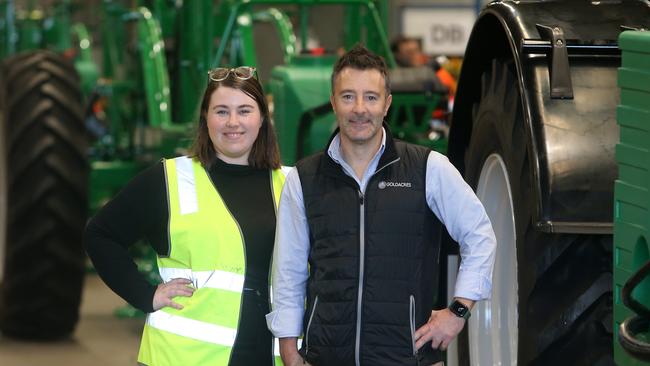Regional jobs: 84,000 workers wanted, but no housing available
With regional vacancies at record highs, employers are desperate to find housing for workers. One Stawell company even bought a motel.
Regional Victoria is screaming out for more workers, as pivotal industries such as agriculture, tourism, hospitality and construction experience huge demand for goods and services.
A record 84,000 jobs in regional Australia were advertised online in March, according to figures compiled by the Regional Australia Institute.
That’s up 26.8 per cent compared to the same month last year, when 66,200 jobs were posted.
In Victoria, regional vacancies peaked at 13,357 in March, up 1710 on the previous month and a massive 39.1 per cent up on March last year.
RAI chief economist Kim Houghton said regional job demand was even stronger than it was during the mining boom of the early 2000s, and was a positive sign for rural economies. “The regions really bounced back strongly in terms of job demand,” Mr Houghton said.

“In the agricultural regions ... rain has come back and production is up. The tourism industry domestically didn’t collapse. There is a lot of confidence ... employers are trying to employ people and grow.”
Data from online employment marketplace Seek shows regional job ads have shown more growth than those in Victoria’s urban areas in the past year, with regional ads up 22.3 per cent compared to metro growth of 18.4 per cent for the 12 months to April.
While more jobs were cause for optimism, Dr Houghton said there were also significant constraints limiting the number of people who could fill roles in the regions.
One was the lack of “sheer shoes on the ground”, he said. The second, more concerning problem was the lack of regional housing.
“A lot of regions feel like they are at capacity with available housing at the moment,” Dr Houghton said.
“What worries us really is we keep hearing stories of regional employers who can see good growth prospects; they have access to capital... are able to expand, but are not investing because they are worried they won’t get staff.”
Stawell meat processing company Frew Foods International usually employs 500 people, but is currently running with 100 vacancies.
It also has plans to grow to a workforce of 750 by 2025. Managing director Robert Frew said he could see the housing crisis coming well before Covid hit and knew he would struggle to attract workers if they had nowhere to live. So four years ago he bought a motel to offer new employees affordable short-term accommodation, while they searched for rentals.

“The simple fact is that it is the most critical point of our business – not finding workers, but finding accommodation,” Mr Frew said.
This year he has invested in expanding capacity of the motel accommodation.
Agricultural Appointments managing director Dr Ray Johnson said vacancies for professionals in agribusiness and food manufacturing were now 2.5 times greater than May 2020 and five times what they were in 2012.
“(Demand) has just gone ballistic,” he said.
“And candidate availability has plummeted.”
The number of applicants responding to ads had dropped dramatically, he said, and was driving employers to place more adverts.
Shift Regional is an online platform launched in 2020 that works with regional councils — in the Grampians and Dubbo, NSW — to attract capital city residents to move to regional communities.
Managing director Shane Manley said job demand across regional Australia was “intense right now”, but so too was interest from potential city migrants.
“Before the pandemic, we were averaging 30 inquiries a month. When Covid hit it jumped up to 120 a month,” he said.
Healthcare and hospitality were desperate for workers, and trades were also in short supply, Mr Manley said.
“Electricians, carpenters, welders ... there is a shortage across all trades,” he said.
“When someone registers their interest in moving, we can virtually guarantee them something in a regional area.”
‘EVERY INDUSTRY IN THE STATE IS BOOMING’
Job seekers can look to the regions for opportunities, with skilled labour in high demand.
Agricultural chemical spray equipment manufacturer and supplier Goldacres reports a significant growth in their workforce of 100 employees in the past two years alone.
Goldacres, which has its head office in Ballarat, now employs more than 200 staff nationwide.
“We’ve seen a massive shortage of skilled labour. It seems every industry in the state is booming,” said sales and marketing operations manager Stephen Richards.

Mr Richards puts Goldacres’ growth down to an increase in demand for their product, good seasonal conditions and the addition of three dedicated Sprayer Centres across Australia.
Goldacres “upped the ante” in advertising vacancies and changed their marketing focus to attract employees to their growing business.
“Our marketing was just to the end user of products. Now we sell the actual business to the people to work in it,” Mr Richards said. “With our labour force, when we’re selling work at Goldacres we’re selling Ballarat as well. People might be looking for a change of lifestyle.”
A “can do” attitude is an important attribute for a prospective employee, Mr Richards said.
“I guess different jobs require different skills. Punctuality is important in the factory, so much so that we offer a bonus for factory staff to turn up on time,” he said.
“If someone turns up on time and is keen to work, they generally go well at Goldacres.”
Eliza Miller is one of Goldacres’ most recent recruits.
The 25-year-old was hired to the HR team and is being trained across other facets of the business.
“I feel grateful to have the opportunity to choose my own pathway,” Eliza said.
“They’re good here, they look for employees based on their attitude. They’re willing to train and teach people how to do anything if they have the right attitude.”
Eliza said she looked for trust from an employer.
“The ability for them to trust you and give you a go is important.
“They’re trusting me to have a go here and helping me. You don’t find that everywhere.”
From a cropping and sheep farm in Pyramid Hill, Eliza completed Bachelor of Arts and Bachelor of Business degrees as Covid hit.
She worked for her parents, who own and run agricultural stores, filling in a maternity leave position, before moving to Bendigo to take on a data entry and sales role.
“Looking for a job during Covid, you’d apply for a gazillion jobs and not everyone would get back to you. Everyone had lots of people applying for jobs and I felt like a number,” she said.
“A lot of people were moving out of Melbourne at the time and it was difficult to differentiate yourself to those who looked better on paper.
“There are more opportunities now, but at the start of Covid it was pretty brutal with the competition from people with more experience.”




